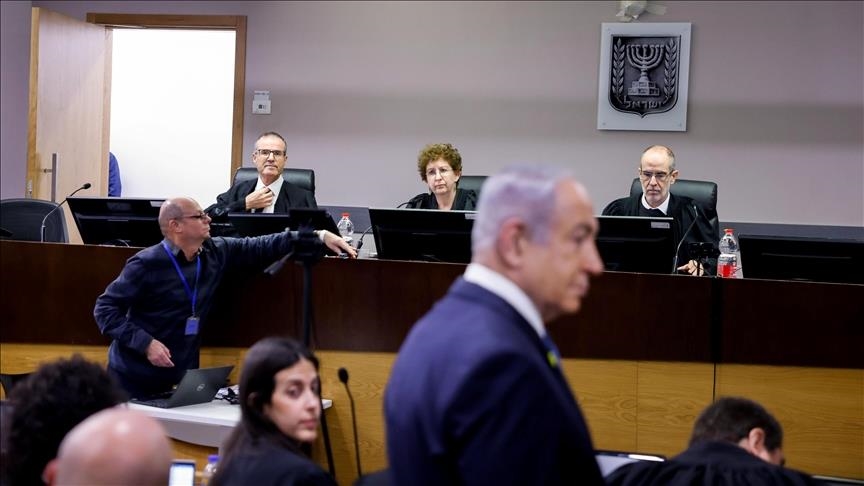Israel’s attorney general rejects Netanyahu’s request to delay corruption trial
Israeli premier faces charges of bribery, fraud, breach of trust that could lead to imprisonment if proven

JERUSALEM/ANKARA
Israel’s attorney general on Friday rejected Prime Minister Benjamin Netanyahu’s request to postpone his corruption trial for two weeks, local media said.
Netanyahu had asked the Jerusalem District Court to delay his trial, claiming that he needed to focus on other matters following Israeli attacks on Iran, including the issue of returning Israeli captives from Gaza.
According to Israel’s Channel 12, the court also rejected Netanyahu’s request and decided to keep the scheduled hearing set for next Monday.
The court judges determined that “the schedule presented by Netanyahu to try to delay his trial sessions does not justify canceling the hearings,” it said.
Attorney General Gali Baharav-Miara earlier said that the reasons detailed by Netanyahu in his request “cannot justify canceling two weeks of hearings."
As a result, Netanyahu is expected to appear before the court on Monday as planned.
Corruption charges
Reacting to the decision, Israeli Finance Minister Bezalel Smotrich criticized both the attorney general and the judges.
“The Attorney General’s Office and the judges of Netanyahu’s government insist on being small dwarfs, lacking any strategic vision or understanding of reality,” he wrote on X.
“They seem determined to help us highlight for the public the destructive and dangerous corruption that has taken hold of the judicial system, and the urgent need to reform it,” he added.
Far-right National Security Minister Itamar Ben-Gvir also criticized the court’s decision, calling it a “detached and miserable decision.”
Communications Minister Shlomo Karhi echoed the criticism, saying: “They live in their own world, isolated… Shame on them!”
Likud lawmaker Avichai Buaron said Netanyahu should simply notify the court and the attorney general that "his duty to the state and the national interest outweigh the need for four more evidentiary hearings, and that he won’t attend in the next two weeks."
For several months, Netanyahu has appeared before the court to respond to the charges against him but the sessions were halted during the recent Israel-Iran war that began on June 13 and lasted for 12 days.
On Thursday, Netanyahu thanked US President Donald Trump for calling to cancel his corruption trial, a move that sparked wide controversy and division in Israel.
Supporters of Netanyahu welcomed it, while the opposition urged Trump not to interfere in Israel’s judicial process.
Netanyahu faces charges of bribery, fraud, and breach of trust that could lead to imprisonment if proven.
In January, Netanyahu began interrogation sessions related to Cases 1000, 2000, and 4000, which he denies. The attorney general filed an indictment related to these cases at the end of November 2019.
Case 1000 involves Netanyahu and his family receiving expensive gifts from wealthy businessmen in exchange for favors.
Case 2000 concerns alleged negotiations with Arnon Mozes, the publisher of the Israeli daily Yedioth Ahronoth, to gain positive media coverage.
Case 4000, considered the most serious, involves providing facilitation to Shaul Elovitch, the former owner of the news site Walla and a telecommunications company Bezeq, in return for favorable media coverage.
Netanyahu, whose trial began on May 24, 2020, is the first sitting Israeli leader to take the stand as a criminal defendant in the country’s history.
He also faces charges of war crimes and crimes against humanity, with the International Criminal Court issuing arrest warrants for him and former Defense Minister Yoav Gallant in November 2024 over atrocities in Gaza, where over 56,300 people, mostly women and children, have been killed since Oct. 7, 2023.
Anadolu Agency website contains only a portion of the news stories offered to subscribers in the AA News Broadcasting System (HAS), and in summarized form. Please contact us for subscription options.







